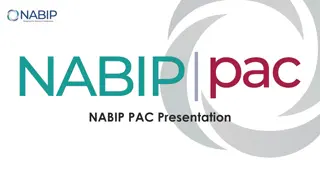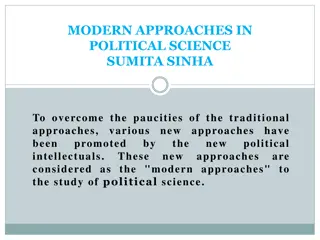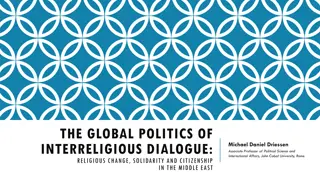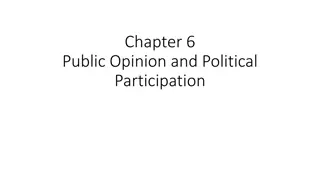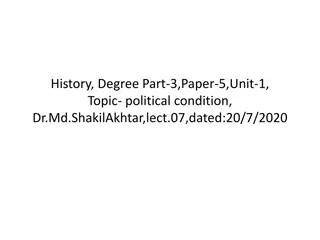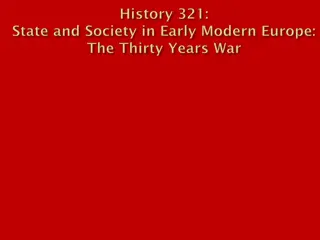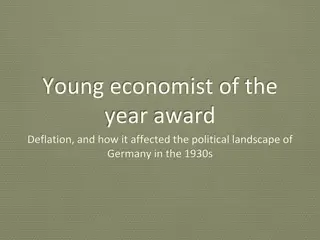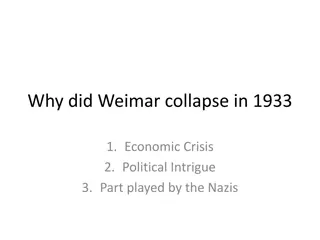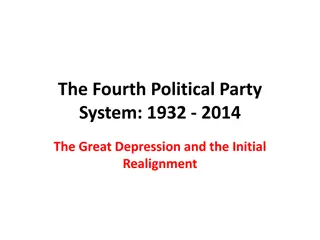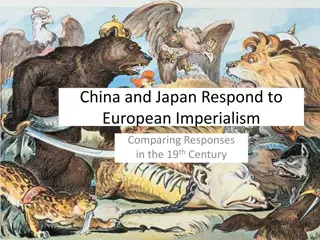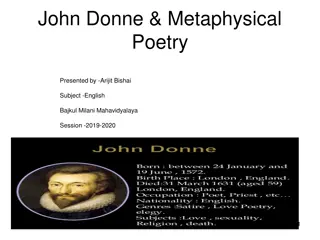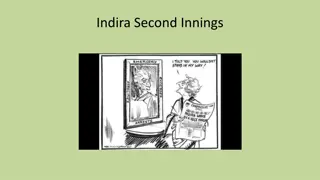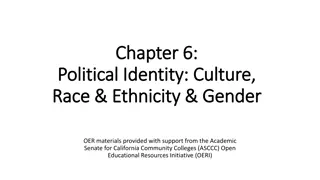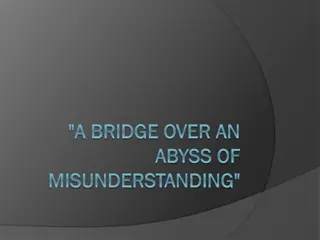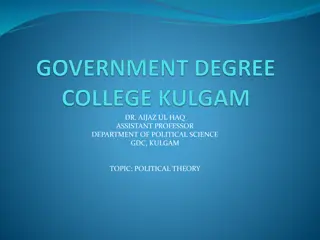Understanding NABIP PAC: Political Action Committee Overview
Federal law prohibits direct financial contributions to federal candidates, hence organizations like NABIP establish Political Action Committees (PAC) to advocate for political priorities. Learn about NABIP PAC, its accounts, eligibility criteria, contribution rules, and how funds are utilized. Disc
1 views • 14 slides
Witch Hunts in East Anglia: Causes and Motives Behind the Witch Hunt Led by Hopkins and Stearne
Witch hunts in East Anglia between 1645 and 1647 were influenced by a combination of economic and political factors. The disastrous agricultural conditions of the mid-1640s, high taxation, poverty, and political turmoil contributed to the witch hysteria. Accusations were primarily driven by tensions
3 views • 17 slides
Contrasting Concepts in Political Science: Normative vs Descriptive Approaches
Normative and descriptive concepts in Political Science explore contrasting viewpoints on how things should be versus how they actually are. While normative claims focus on value judgments, descriptive claims deal with facts. These concepts complement each other by providing both theoretical and pra
0 views • 10 slides
The Life and Works of John Milton
John Milton, born in 1608 to a prosperous family, led a life marked by educational achievements, controversies, marriages, and political involvement. His career as a writer included works that stirred debates, such as his Divorce Tracts. Despite personal tragedies and political turmoil, Milton's ded
0 views • 15 slides
Modern Approaches in Political Science: Overview and Characteristics
Explore modern approaches in political science pioneered by intellectuals to address the limitations of traditional methods. These approaches emphasize empirical data, interdisciplinary study, and scientific methods to draw conclusions beyond political structures and historical analysis. Key modern
1 views • 13 slides
Social and Political Turmoil in 1960s Australia: A Snapshot
The 1960s in Australia were marked by significant political and social upheaval. Young people challenged traditional values, women fought for equal rights, and citizens protested against issues like the Vietnam War and racism. The era saw a push for change and reform, with pivotal events such as the
0 views • 10 slides
Interdisciplinary Approach in Political Science and Its Relation with History
The need for an interdisciplinary approach in political science emerged in the 20th century to study political issues from various social science perspectives. This approach emphasizes the interrelation between political science and other disciplines like history. History provides the foundation for
0 views • 23 slides
Institutionalism and Methodological Issues in Political Science
Institutionalism is a foundational concept in political science, emphasizing the study of governing institutions and their role in shaping political behavior. It explores inductive and deductive approaches to research, highlighting the significance of empirical evidence and theoretical assumptions.
0 views • 19 slides
State-Sponsored Interreligious Dialogue in the Middle East: A Political Analysis
This research delves into the growth of state-sponsored interreligious dialogue initiatives in the Middle East between 2000-2020. It explores the political significance, impact on relations between political and religious authorities, and implications for religious practices in the region. The thesi
0 views • 23 slides
Understanding Gramsci's Political Theory and its Relevance Today
Gramsci's political theory, focusing on concepts such as hegemony, historical bloc, and the role of intellectuals, offers valuable insights into contemporary political challenges. Explored through the lenses of Prof. Ken Spours and Stuart Hall's analytical tradition, this analysis sheds light on Con
0 views • 13 slides
Evolution of Citizenship in Liberal Democracy
Citizenship within liberal democracy entails equal rights, duties, liberties, and constraints for individuals within a political community. The entrenchment of civil and political rights has shaped the struggle for membership and participation in political communities. Civil rights, essential for in
1 views • 11 slides
Understanding Political Theory through a Contextual Approach
Exploring G.H. Sabine's perspective on political theory through a contextual approach, emphasizing the importance of historical context and societal influences. Sabine argues that while political theory evolves with its contemporary politics, it should be analyzed within its specific time and social
0 views • 9 slides
Understanding Public Opinion and Political Participation
Public opinion and political participation are influenced by various factors such as financial interests, family, education, and party identification. Measuring public opinion accurately through scientific surveys is crucial in a democracy. Traditional participation methods like voting and civic vol
5 views • 7 slides
Literature and Historical Events in the Early 17th Century
Queen Elizabeth's death, James I's reign, Charles I's civil war, and Cromwell's era marked the early 17th century. Major literary works by Donne, Jonson, and Bacon flourished, reflecting the social and political turmoil of the time. Jacobean writers like Herbert and Marvell emerged, paving the way f
6 views • 7 slides
Political Turmoil in Pre-Babur India
Babur, a Turkic ruler, seized power in India in the early 16th century amidst a chaotic political landscape. With weak rulers in Delhi and conflicting powers across the subcontinent, Babur's successful invasion marked a significant shift in Indian history, leading to far-reaching consequences.
0 views • 8 slides
Understanding Political Beliefs and Behaviors: A Comprehensive Overview
Explore the formation, evolution, and transmission of political beliefs, as well as the impact of differing beliefs and behaviors on the political process. Delve into platform issues, political affiliations, and their influences to gain a deeper understanding of the political landscape.
1 views • 53 slides
European Political Situation in 1635
In 1635, Europe was embroiled in political turmoil with various regions grappling with debt, overspending, and military conflicts. France experienced a significant increase in revenue but faced challenges due to high military spending. Saxony and the Holy Roman Empire struggled with mounting debts a
2 views • 26 slides
Understanding Nationalism in Political Science
Nationalism, a complex concept, defines the nation as the fundamental unit of political rule. It encompasses a mix of objective and subjective factors, including cultural, ethnic, and political traits. The definition of a nation is subjective, based on how its members perceive themselves as a distin
0 views • 27 slides
Understanding the Book of Hosea: Adultery, Judgment, and God's Grace
Explore the themes, political background, and key verses of the Book of Hosea. Hosea, a prophet during a time of Israel's unfaithfulness, delivers a message of judgment and repentance amidst political turmoil. Discover the significance of Hosea's prophecies and the call for Israel to turn back to Go
0 views • 52 slides
Economic Crisis and Political Turmoil in 1930s Germany
Deflation and the Great Depression had a profound impact on Germany in the 1930s, leading to widespread unemployment, economic turmoil, and political unrest. The Weimar Republic faced severe challenges as the Nazi party gained power amidst the economic crisis, exacerbated by the aftermath of World W
0 views • 16 slides
Factors Leading to the Collapse of the Weimar Republic in 1933
Economic crisis, political intrigue, and the rise of the Nazis were key factors in the collapse of the Weimar Republic in 1933. The Wall Street Crash of 1929 exacerbated Germany's economic problems, leading to massive unemployment and social unrest. Political errors and the erosion of democracy furt
0 views • 15 slides
Understanding Political Science: A Comprehensive Overview
The study of political science delves into various aspects, from the pursuit of the good society to the exercise of power and the allocation of resources. It encompasses specialized fields such as American politics, international relations, comparative politics, public policy, and political philosop
0 views • 5 slides
The Fourth Political Party System: 1932-2014 - The Great Depression and Economic Realignment
The Fourth Political Party System in the US, spanning from 1932 to 2014, was significantly influenced by the Great Depression. Factors like the boom in road construction, the housing industry, and the stock market bubble led to economic turmoil. Key figures like Herbert Hoover expressed optimism bef
0 views • 14 slides
Political Development Theory and Practice: An Overview
Political development refers to the evolution of institutions forming the political power system of a society. Initially popular in the 60s-70s to describe political change, it later fell out of favor for being Euro-centric but has since regained significance. The concept encompasses aspects like po
0 views • 13 slides
Political Party Funding Act 2018 Overview
The Political Party Funding Act of 2018 in South Africa aims to enhance multi-party democracy by regulating the funding and donations to political parties. It establishes the Multi-Party Democracy Fund funded by private sources, alongside the existing Represented Political Party Fund. The Act prohib
0 views • 17 slides
Understanding Political Party Funding Act of 2018
The Political Party Funding Act of 2018 regulates the funding of political parties in South Africa, ensuring equitable and proportional funding for parties participating in national and provincial legislatures. The Act defines various terms such as donations, foreign persons, and political parties,
0 views • 42 slides
The Opium War and Its Impact on China: Political, Economic, and Social Perspectives
The Opium War was a significant historical event that led to the signing of the Treaty of Nanjing in 1842 between China and Great Britain. This treaty marked the beginning of unequal treaties and extraterritoriality in China. The war stemmed from the British East India Company's opium trade, which l
0 views • 12 slides
Evolution of Political Ideas and Influences on American Founding
In the history of politics, major ideas like laws of nature, unalienable rights, divine right of kings, social contract theory, and rights of resistance have influenced the American founding. Various traditions such as Judeo-Christian, English common law, Enlightenment, and republicanism played a si
0 views • 68 slides
Somerset's Governance and Foreign Policy in Edward VI's Reign
Edward VI's reign under Somerset saw significant changes in governance, marked by Somerset's ambitious moves to consolidate power and promote his supporters. However, factional rivalries and poor decision-making led to internal turmoil. Somerset's foreign policy aimed to assert England's claim over
0 views • 12 slides
John Donne: A Journey Through Metaphysical Poetry and Personal Turmoil
John Donne, a prominent figure in Metaphysical Poetry, was born into a Roman Catholic family at a time of religious turmoil in England. Despite facing personal tragedies, struggles with faith, and financial difficulties, Donne's poetry reflected his deep emotions and complex thoughts. His life was m
0 views • 26 slides
Political Turmoil in 1980s India
The political landscape in 1980s India was marked by significant events such as the rise of communal tensions in Kashmir, the emergence of Sikh separatism in Punjab, and the assassination of Prime Minister Indira Gandhi. These events led to a period of turmoil, including Operation Blue Star and anti
0 views • 15 slides
Explore the Fascinating World of Political Science
The Department of Political Science offers a range of courses, delving into topics such as political theory, international relations, and governance. Understand the distinction between politicians and political scientists, and explore branches of political science like public administration and huma
0 views • 16 slides
Understanding Political Identity: Culture, Race & Gender in Society
Explore the intricate aspects of political identity, culture, race, ethnicity, and gender in society. Discover how individuals shape their identities and the impact of political mobilization on society. Uncover the significance of political socialization and the role of societal institutions in shap
0 views • 20 slides
Evolution of Political Protests in Modern Russia: A Historical Overview
This article provides an in-depth analysis of the evolution of political protests in modern Russia from 1990 to present. It discusses the attitude of Russian journalists towards protests, basic concepts of political protest in modern political science, myths surrounding protests in Russia, and the f
0 views • 24 slides
Key Events in the Modern World: Science, Politics, and Controversy
In 1919, pivotal discoveries and incidents shaped the course of history, from confirming Einstein's theories to political turmoil. Notable events include the solar eclipse confirmation of a new theory of the universe and Einstein's mention in the New York Times. The Principle of Equivalence, Marcel
0 views • 22 slides
Impact of Political Stability on Equity Trading Costs of Cross-Listed Firms
The research explores the relationship between political stability and equity trading costs of cross-listed firms, highlighting the impact of political institutions, liquidity, and investor protection. It delves into the importance of factors like quality of political institutions, transparency, and
0 views • 24 slides
Interdisciplinary Relationships in Political Science
Political science and history share a symbiotic relationship, with history providing the foundation for political analysis while political science influences historical events. The contribution of economics to political science is evident in how economic conditions shape political ideologies and pol
0 views • 12 slides
Understanding Political Theory: Definitions, Differences, and Significance
Political theory encompasses systematic explanations of political phenomena, distinct from political thought which involves ideas and opinions of philosophers. It constitutes both political science and philosophy, addressing both empirical and evaluative aspects. The significance lies in finding sol
0 views • 7 slides
Remedial Measures Implemented by Indian Political Party
Explore the impactful remedial measures taken by a prominent political party in India through a collage presentation. Delve into the functions of political parties, understanding partisanship, the necessity of political parties, and more. Gain insights into the significance and role of political par
0 views • 23 slides
France's Immigration Debate: Tragedy Fuels Political Turmoil
A tragic incident involving the murder of a 12-year-old French girl, Lola, by an Algerian-born woman has stirred controversy and division in France. The heinous crime has reignited debates on immigration laws, undocumented population, and far-right political responses. The incident sheds light on th
0 views • 5 slides
